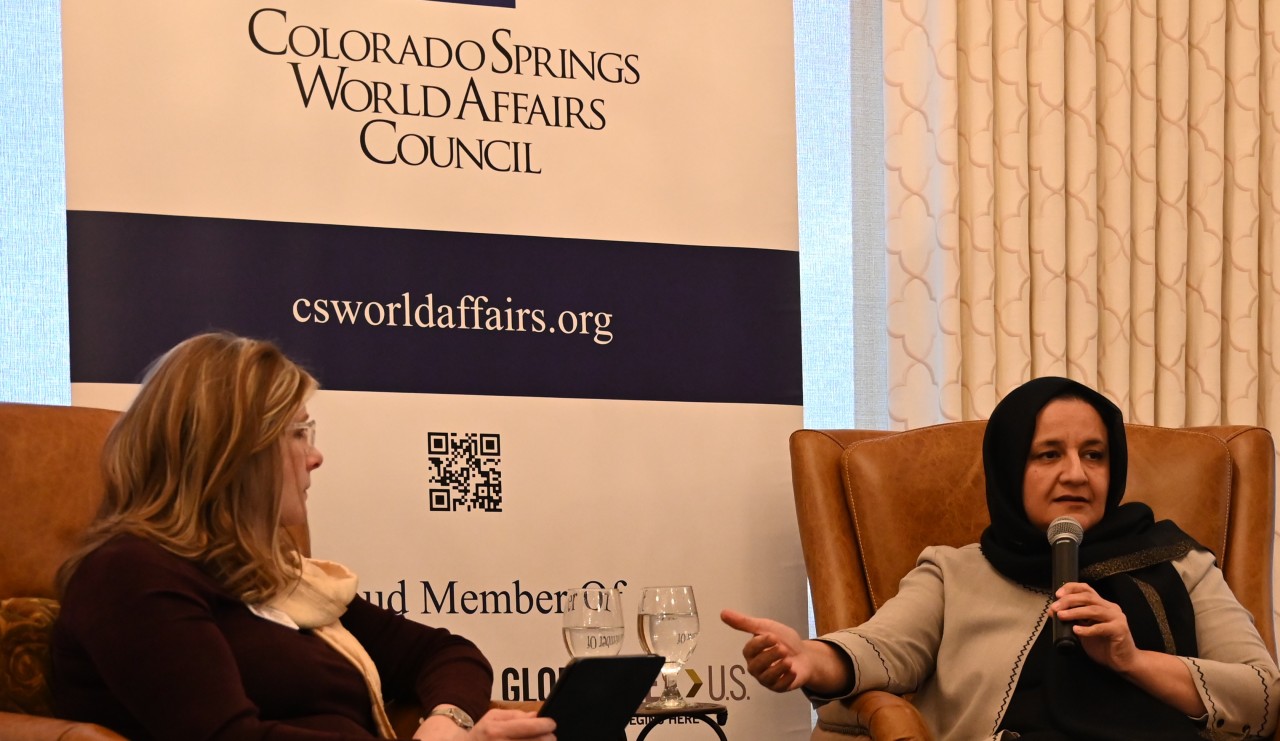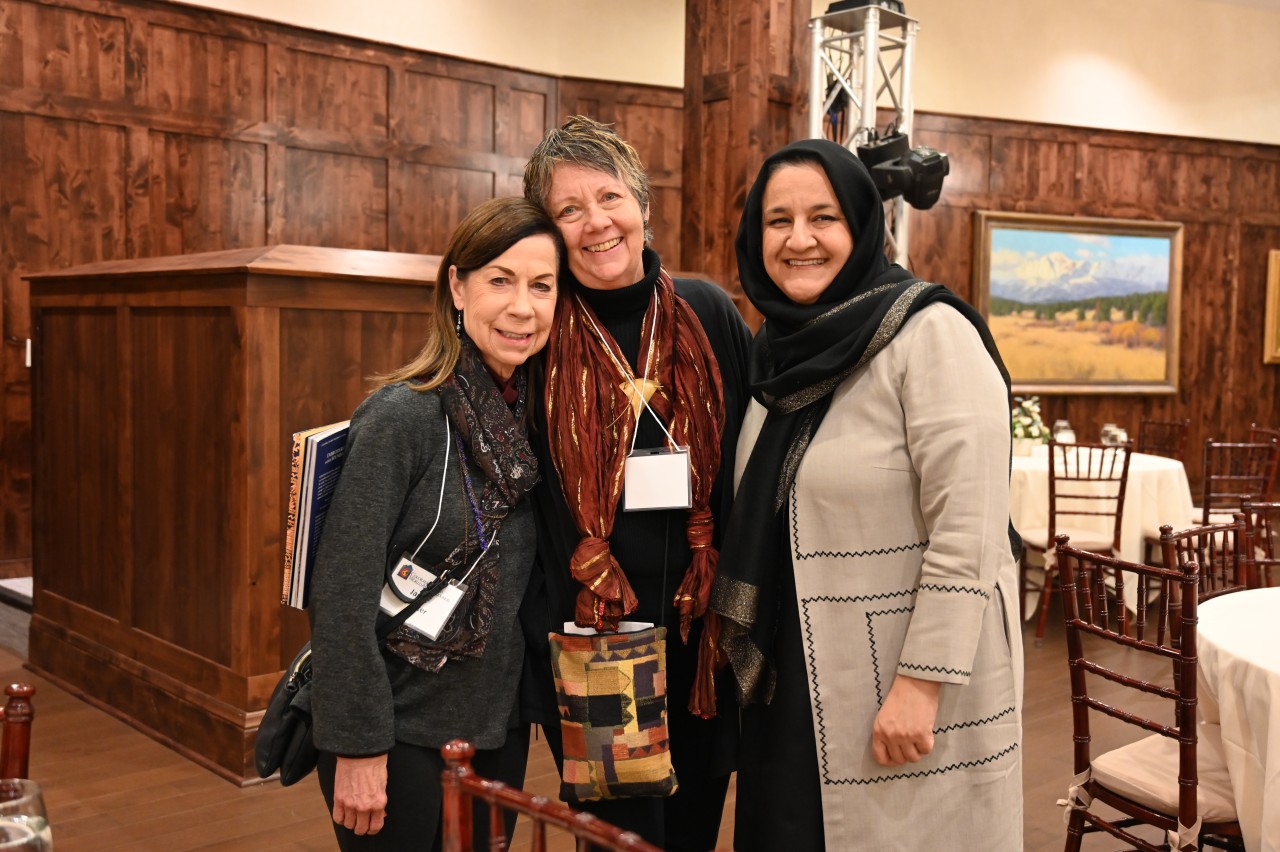Rangina Hamidi Interview
By: Sa'Mya Hall
The Colorado Springs World Affairs Council had the fortunate opportunity to host Rangina Hamidi in our March speaker series titled, "Is Afghanistan A Lost Cause?" After sharing her perspective on the issues facing Afghan citizens, Hamidi left us with a fundamental understanding of the culture and current climate the country is facing under Taliban rule. Hamidi is a dual Afghan and American citizen and the former Minister of Education in Afghanistan until August 15th, 2021, when the Taliban took control of the government for the second time—two weeks before American troops officially left the country. Amidst the transfer of power, the Taliban requested a meeting with Hamidi. She recalls her encounter with the group stating, "To my surprise, to the world's surprise, they were very respectful, they greeted me well, they received me well. They saved the seat that I normally used to sit on in my office, and we had nice long conversations with various different groups of my staff and other members of their team. Back and forth back and forth, and 4 ½ hours later the meeting ended with one of the officials in this group of five literally stating we need to have more of these conversations to understand each other, respect each other and love each other. It was a profound experience for me, but I felt it was difficult to hope."
The future of Afghanistan under the Taliban's rule leaves little promise for the future of its citizens, particularly women. Harsh laws against Afghan women and girls were muscled into society; women were no longer allowed to leave their homes without a male escort, and girls were no longer allowed to pursue education after the sixth grade. Having a daughter of her own, Hamidi decided it would be best for her family to move back to the United States. She elaborated on her choice and mentality during the chaos in August 2020, "You just can't help but let the fear overtake you, and so it was the fear of the unknown and the fact I had a daughter of an age that was really questionable at the time, and she was going to be going to the sixth grade. I sensed it would be better to go to a safe and secure place because I don't know what tomorrow will bring."
Hamidi has remained a fierce advocate for Afghanistan since her departure and has returned to the country three times in the past three years. She explains her visits, stating, "It was nice going back, but have things changed? Absolutely. The 20-year era Afghanistan spent with international communities working hard to bring the changes that we envisioned is now in the hands of new people with a different vision. The 40 million people, but particularly the women and girls of that country, are just surviving to the extent that they can." Hamidi's experience with the environment affecting Afghan women has allowed her to share the complexity of their issues and oppression. There are 34 provinces throughout the country, and within those, there are different cultures that encompass diverse values and opinions on what is expected of women and girls, making the oppression Afghan women face more complex. Most of those territories are rural, which makes progressive change for women harder than it would be in the city; Hamidi states, "If you go to Afghanistan today, and you go to a village outside of the cities, their life has not changed from say, a couple centuries ago. So, that distinction needs to be made. The progress that has been made in the past 20 years was predominantly made by folks living in the cities, which is not the majority of the population. The kinds of challenges women and girls are facing in Afghanistan is the same challenges they've been facing for centuries. The majority of women didn't really see the benefits of education or development in healthcare."
During America's 20-year reconstruction effort in Afghanistan, we have contributed over one billion dollars toward humanitarian assistance and over 500 billion on military intervention—totaling two trillion American tax dollars going toward the ultimately failed attempt at western modernization of Afghanistan. Hamidi powerfully emphasizes the questions Americans should have about our efforts, stating, "It's our tax dollars that had been funding the war for 20 years, causing lives to be lost. Obviously, of our own kids here, but maybe three to four times more in Afghanistan, only to hand it back to the Taliban. Posing political questions we, as American citizens, should address." To truly fix the issues in Afghanistan, Americans should consider the history behind the country to understand the root causes of their current socio-political institutions. Hamidi elaborates on this fact, saying, "We have to remember Afghanistan is over 5,000 years old. We weren't just born in 2001. Sure, we lost our identity in 2021, but we are a complex nation with complex people." Afghanistan has never been successfully conquered or colonized by any other country. And since international intervention hasn't worked to invoke progression and a positive change for Afghan women, Americans should reconsider our approach to helping them. Hamidi has found a way to make a difference in the nation while acknowledging its rich history and catering to the rigid laws for women.
Her company, the Kandahar Treasure, provides an opportunity for Afghan women to earn an income by selling their embroidery art, also known as Khamak in Kandahar. Hamidi takes embroidery materials to the women employed under her company. In turn, the women create pieces to be sold to whoever is interested in adorning themselves or their home with uniquely crafted textiles. Hamidi's company adheres to Afghanistan's laws which allows an opportunity for the women who are bound at home to make money and help themselves. She "took the work to them in their homes. The women were happy, the men were happy, and their families were happy, and it didn't create any problems or questions about what I was doing. Women were producing materials they already knew how to make, so I didn't have to waste time training them." Not only do the embroidered adornments create an additional income for households, but it is a representation of the Afghan culture and history. Hamidi states "The Afghan diaspora, particularly my parents' generation, have keyways of elements of keeping our identity through our arts and crafts and clothing. When you're stuck at home your only space is home, tapping into their talents in embroidery is a way of women's expression without really calling it that themselves. This is an opportunity for women to celebrate their identities as Afghans. That's the closest way to stay connected to a country that they're probably not going to see anytime soon." Due to the diverse regions within the country, different embroidery designs vary according to local culture, making their art pieces uniquely beautiful and worthwhile to share with the rest of the world. Hamidi's technique is to change the situation Afghan women are facing without eliminating the culture in which they are accustomed. Her priority is to make true and lasting change from within the country by its own citizens, not through forced international intervention.
While an education for women and girls in Afghanistan is a priority, Hamidi explains the layered implications of the narrow narrative, "The past three years every decree that has come out has somehow been anti-women and anti-girl in the sense of limiting and preventing everything for them. So, the fear for women's rights in all aspects is definitely there but of course the most obvious is the lack of opportunity to complete education. But, at the same time, let's assume the doors of education open tomorrow, but they still aren't allowed to work or do anything with their higher education. So you know, it's a ripple effect of questions that address these layers of impossibilities under this new regime." Throughout history, Afghanistan has compounded its issues, creating the current oppressive society that Afghan citizens live in today. Though American troops have left, we can't lose hope for the nation. Hamidi shares this passion "I have faith in the resilience of my sisters and my daughters and Afghanistan. One day, they will figure things out, and yes, they are going through a hard time right now but when I look at history, women and girls have faced hard times and oppression 120 years ago around the world. There was a process that women and girls have gone through, and we need to give Afghan men and women a chance to plant that seed of change and revolution by themselves within the society for lasting change."
When you subscribe to the blog, we will send you an e-mail when there are new updates on the site so you wouldn't miss them.



Comments